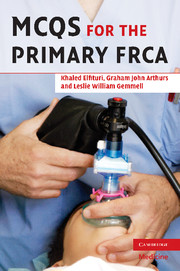Book contents
Introduction
Published online by Cambridge University Press: 03 December 2009
Summary
This book contains 540 questions in 6 papers as they might appear in the examination. Each paper has 90 questions, each with 5 parts. There are 30 physiological questions, 30 pharmacology questions and 30 physics, clinical measurement and statistics questions.
The questions have been constructed using information remembered by candidates sitting the London college examination in recent years. These may not be the exact questions as they appeared in the examination but will be of the same degree of difficulty and cover the same topics.
In order to pass the primary anaesthesia examination, knowledge is required and it is essential to learn about all the topics that might be examined. These questions are a guide to the syllabus and the subjects that should be covered before appearing in the examination.
It is probably not realistic to try to learn by just reading an MCQ book. But once the trainee has studied for 6 months or more then a book such as this is one way of testing whether enough of the topics have been covered and then the level of knowledge and understanding that has been achieved.
It is important to practise a technique for answering MCQ questions. In the examination hall it is a good idea not to record the answers on the answer sheet during the first 15 minutes as that is when mistakes of entering the answers under the wrong question number occur.
- Type
- Chapter
- Information
- MCQs for the Primary FRCA , pp. vii - viiiPublisher: Cambridge University PressPrint publication year: 2008



